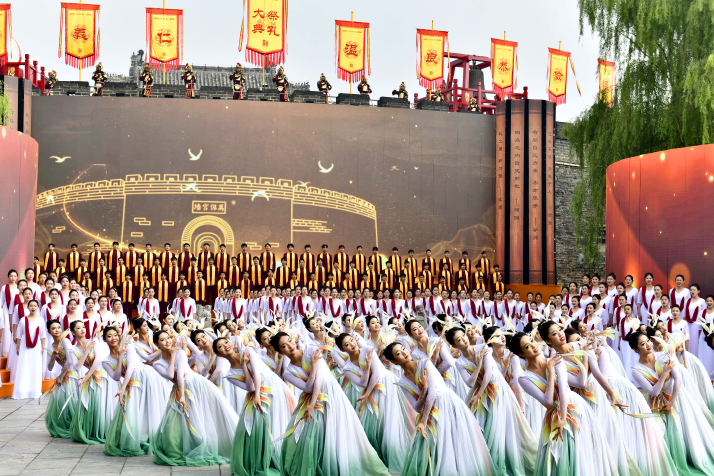| Governance |
| Why Marxism thrives in China | |
|
|
 Participants release fries into the Xiangjiang River to help restore ecological balance during an event in Changsha, Hunan Province, on June 9 (XINHUA)
Since the mid-19th century, Marxism has profoundly shaped human society, but nowhere has it been more successfully adapted than in China. This process—often called the "Sinicization of Marxism"—reveals how powerful ideas can be transformed when they interact with a distinct cultural tradition.
No foreign ideology has shaped a nation in modern times as deeply as Marxism has influenced China. Its longevity here stems not from rigid doctrine, but from remarkable compatibility between Marxism and China's 5,000-year-old cultural traditions. The result has guided the country through its most transformative century, shaping its revolutionary struggle, national development and ongoing reforms. What explains this unique compatibility? The answer lies in profound philosophical resonances between 19th-century European thought and China's ancient intellectual traditions. While differing in origin, they share fundamental views on humanity's relationship with nature, society's proper organization and the moral foundations of governance, which have allowed them to blend organically. Harmony between humanity and nature The traditional Chinese culture has long revered the concept of "harmony between heaven and humans (tianrenheyi)," a belief that seeks balance between humans and the natural world, and the concept of daofaziran, a belief that promotes conforming human conduct to the laws of nature (Dao, also written as Tao). These ideas, found in the works of ancient philosophers Confucius (551-479 B.C.) and Zhuangzi (ca. 369-286 B.C.), share common ground with Marxism's ecological perspective. Marxism, too, emphasizes the interdependence of humanity and nature. It views humans not as conquerors of the natural world, but as "part of nature," while also acknowledging humans' unique ability to transform their environment through labor. Rather than promoting the exploitation of natural resources, Marxism advocates a balanced relationship where nature is respected even as it is utilized. This Marxist principle of "humanized nature" aligns perfectly with China's ancient wisdom, creating a philosophical bridge between the two worldviews.  A ceremony paying tribute to Confucius in the revered ancient philosopher's hometown of Qufu, Shandong Province, on September 28, 2023 (XINHUA)
People-centered governance China's traditional political philosophy champions the idea that "the people are the foundation of the state (minweibangben)." This idea emphasizes that social stability depends on meeting people's needs. And great rulers were those who governed with virtue, ensuring stability by earning societal trust. Similarly, the Confucian ideal of "the world as one community (tianxiadatong)," envisioned a just society where resources are shared equitably for the common good. Marxism, with its focus on class equality and the liberation of the working class, adhering to the core concept of being people-oriented and always putting the people first, found fertile ground in these principles. Both traditions reject exploitation and envision a society where collective wellbeing takes precedence over individual greed. This shared vision helped Marxism resonate deeply with the Chinese people from the moment it arrived on China's shores. Balancing individual and collective needs Chinese culture traditionally has always emphasized the interconnectedness of family, nation and society. It views the state and society as an extension of the family, where loyalty, duty and mutual responsibility bind people together. The individual household is a "small country," while the nation is a "big family." This perspective emphasizes that people should root themselves in the community rather than pursue purely individual interests. Marxism, too, prioritizes the collective, viewing humans as fundamentally social beings and arguing that true fullest individual freedom can only be achieved within a just social structure and supportive communities. Both philosophies reject extreme individualism, instead valuing a balanced relationship between personal development and communal harmony. This cultural synergy made Marxism feel less like an import and more like a natural evolution of Chinese thought. Moral excellence as a path to progress Traditional Chinese ethics celebrate virtues like "unceasing self-improvement" (ziqiangbuxi) that promotes personal development and "harmony in diversity" (heerbutong) that encourages respect for diversity and peaceful coexistence. These principles underscore resilience, adaptability and mutual respect—qualities essential for both personal growth and societal advancement. Marxism, while rooted in materialist analysis, also upholds the importance of moral progress. It emphasizes moral self-discipline while seeking "happiness for the majority." It sees ethical development as inseparable from economic and social change, and sees human freedom as the ultimate goal of social progress, striving for a world where all people can flourish. This alignment with China's moral traditions gave Marxism a persuasive ethical appeal. A dynamic fusion Marxism did not succeed in China by sheer force of ideology—it succeeded because it made sense within China's cultural framework. By blending Marxist theory with China's ancient wisdom and modern realities, Chinese Communists created a system that was both revolutionary and authentically Chinese. Today, as China continues to evolve, this adapted Marxism—socialism with Chinese characteristics—remains a guiding force. Upholding the theory, China has achieved unprecedented transformation, lifted hundreds of millions from poverty and charted a unique path toward prosperity. Far from being a rigid doctrine, Marxism in China is a living philosophy, one that grows and adapts while staying true to its core principles. In this new era, China's story is still being written. But one thing is clear: Marxism thrives here not because it was imposed, but because it was embraced—refined through the lens of a civilization that knows how to endure and adapt. The author is a professor of Chinese politics at the Shanghai Academy of Social Sciences Copyedited by G.P. Wilson Comments to yanwei@cicgamericas.com |
|
||||||||||||||||||||||||||||
|